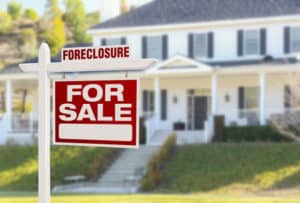The value of investing in foreclosed properties

Previously, investors were often hindered by the difficulty of finding information relative to a foreclosed property, but as the auction process continues to move online, it becomes much easier for investors to find foreclosed properties that match their wants and allows them to gain access to information regarding the property through the same platform.
With the robust ability of an online real estate marketplace, like Auction.com, investors are more confident in investing in foreclosed real estate and as a result, better positioned to realize the benefits these investments bring much faster, which also stabilizes communities sooner.
The community impact of investing and reselling
The blight associated with foreclosed assets can permanently damage the quality of life for a community and its residents. As a practical example, until recently, most vacant homes were boarded up with plywood in attempt to deter vandals. This process, along with the lack of proper ongoing maintenance, resulted in an inevitable deterioration of the property. Whether wildlife living in unkempt yards, or vacant properties serving as havens for criminal activity, foreclosed properties have for too long threatened the long-term stability of local communities.
Foreclosed and vacant properties also tend to negatively impact local economies by creating new burdens on resources, such as police and fire departments. Additionally, as a property sits in foreclosure, the previous homeowner may fall behind on paying property taxes, which in turn puts a drain on emergency services and schools that rely on taxes for funding. If there are multiple foreclosed assets in an area, this issue is compounded exponentially.
In today’s market, many investors appreciate foreclosed properties’ value as investments because they are generally more affordable to obtain and later renovate for resale. Particularly when marketed on an online real estate marketplace, foreclosure properties are often easier to locate as a well-equipped platform maximizes the number of views a property receives, and is accompanied by valuable information about the properties’ condition, tax liens, etc.
What’s more, investors looking to resell foreclosed assets now have greater access to an ever-growing number of construction and rehabilitation contractors that can expedite the time needed to rehab a property and put it back on the market.
Perhaps most importantly, investing in (and rehabbing) a foreclosed property provides investors with an opportunity to generate a profit while also contributing to the health and stability of a neighborhood sooner. By investing in an existing home, the property value for both the home being renovated and the surrounding properties increases.
Finding additional income through renting
The American dream has long centered on the idea of home ownership. Today, that dream has expanded to include the possibility of owning multiple residential properties that can provide a second income. Investors look to gain the best ROI possible on an asset, and increasingly, that comes through the opportunity to build a portfolio of rental properties – ones that can generate regular income through rental and provide meaningful income tax deductions with relatively low-overhead required to manage those properties.
Rather than navigating the traditional foreclosure process to do so, investors who leverage an online platform like Auction.com can expect to benefit from the more optimal, streamlined and transparent experience that is offered. The online platform also contains property details, due diligence documents and property value information that enables an investor gain confidence to bid on a particular asset in auction.
In addition, investors who utilize the online platform are able to view multiple properties at once, saving time and shortening the period needed to ‘flip’ the property. While investors may initially pay for structural and cosmetic improvements, they ultimately benefit from the long-term return on that investment through renting.
In some cases, investors are finding renters in the form of the existing homeowner of the property. This strategy is preferable as it enables the bank to avoid the eviction process altogether while ensuring that the property remains occupied. The homeowner (now renter) benefits as he or she may now be able to more affordably stay in their home, providing additional peace of mind for the occupants as they no longer need to look for a new residence, and, if children are involved, transfer to new schools.
A positive impact on the community
A stable home is the cornerstone of a vibrant community and as such, it’s critically important to remain occupied in order to deter the risk of crime, contribute to the local tax base and mitigate blight commonly associated with vacant properties.
When investors choose foreclosed, vacant properties to rehabilitate, they are not only positioned to profit from the resell value or from rent from a resident, but they are active participants in making local communities safer. Even during the rehabilitation process, this is true. Criminals are keenly aware that investors retrofit their properties with security systems such as alarms, lights, cameras, etc. to closely monitor the grounds as construction ensues. This serves as an effective deterrent. When the project is complete, these systems may be left in place to give the new resident the same level of protection.
The key to success in saving America’s neighborhoods lies in leveraging technology and market intelligence to provide a marketplace, like Auction.com, where investors can confidently do business. The positive impact that investors generate when they work to convert foreclosed real estate can be profound. These properties, that a family once called home, gain a second chance at again becoming a home – perhaps even one that a family, and a community, will enjoy for generations.
Source: housingwire.com















 Accessibility
Accessibility